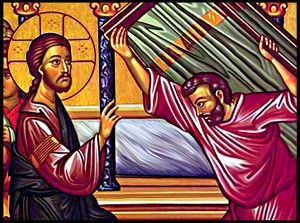The Gospel Project Sunday school lesson for June 16 comes from 1 Samuel and the anointing of Saul as the first king of Israel. Up until this time the nation had been a theocracy—with God alone as their head, and the prophets, priests, and judges serving as God’s messengers to the people. But the people wanted a king. As the student book says, “The people’s request was not necessarily bad, but the heart behind it was—to be like the other nations around them” (p. 30). God instructed the prophet Samuel to anoint Saul as king. Saul was evidently a tall and noticeable man (1 Samuel 9:2), but curiously, when the time came to reveal him to the people, Saul was hiding in the baggage (10:22). It was not an auspicious start to his reign.
King Saul had some victories in battle, and perhaps he started getting overly confident. When Samuel promised to offer a sacrifice before the next battle, Saul didn’t want to wait the allotted time, so he made the sacrifice himself. This was a violation of the ceremonial laws of Israel. Saul implied that he had to do it because the armies were deserting him. However, if he had remembered the story of Gideon (Judges 7), he would have known that it didn’t matter how many soldiers he had if he were truly relying on God to win the victory. In that situation, God had used 300 untrained men to defeat many thousands of the enemy.

Saul continued to disobey what God told him to do. In 1 Samuel 15 he did not destroy all the flocks and herds of the Amalekites as he was supposed to. When Samuel confronted him he started making excuses and pointing fingers (just like Adam and Eve in Genesis 3). “The people spared them! They were going to offer them as sacrifices!” That might sound noble except for the fact that the “sacrifice” didn’t cost them anything. Samuel had to remind him, “To obey is better than sacrifice… presumption is as iniquity and idolatry” (15:22-23 ESV). When Saul was told that God had rejected him as king he sounded somewhat remorseful, but it’s clear his heart was not in it. “I have sinned; yet honor me now before the elders of my people and before Israel, and return with me, that I may bow before the Lord your God” (15:30). His eyes were on himself and his own honor. He didn’t even claim that Samuel’s God was his own God. The Apostle Paul’s words in Romans 10:3 could easily be applied to Saul, “For being ignorant of the righteousness of God, and seeking to establish their own, they did not submit to God’s righteousness.”
While we may be inclined to judge Saul for his failures, we can be just as stubborn and rebellious. We get impatient waiting on God to act, so we take matters into our own hands. We rely on our own analysis of situations rather than seeking God’s will and obeying Him. We value man’s opinion over God’s. We look to our own comfort and honor instead of humbly serving others. We think we can rely on borrowed faith to save us. Our own sinful actions may be a tool God is using to humble us and make us trust in Him alone. We can either repent or harden our hearts toward Him. Even King David, the “man after God’s own heart,” had his faults and sins. The difference was that David desired to obey God and kept turning back to Him. When the prophet Nathan confronted David about his sin with Bathsheba and Uriah, David’s response was true repentance (see 2 Samuel 12 and Psalm 51).
The good news is that there is nothing we can do to thwart God’s purposes. God had planned from before time began to send His Son to redeem us. Jesus was born in the lineage of King David, who was anointed to replace Saul even before Saul had died. David’s kingship wasn’t “plan B” any more than Jesus’ death on the cross was. God foreknew all these events beforehand. “He chose us in Him before the foundation of the world… In love He predestined us for adoption to Himself as sons through Jesus Christ, according to the purpose of His will” (Ephesians 1:4-5). And it is because of Christ alone that we have forgiveness of sins. “In Him we have redemption through His blood, the forgiveness of our trespasses according to the riches of His grace” (1:7). That is the best news available to us!
We each need to ask ourselves: What is my own response to sin? Do I make excuses or do I repent? Is my heart getting harder or softer? Is there anyone who knows me well enough to know what my temptations are? Do I have someone like Samuel or Nathan who is willing to confront me when I sin? Do they keep pointing me back to Christ and the cross?
To paraphrase John Owen (1616-1683), “Unless a man is truly a believer, he cannot kill sin. Killing sin is the work of believers… There is no death of sin without the death of Christ… How can a man kill sin who does not have the Holy Spirit?” (Overcoming Sin and Temptation, 79-80).
“We know that our old self was crucified with Him in order that the body of sin might be brought to nothing, so that we would no longer be enslaved to sin… For if you live according to the flesh you will die, but if by the Spirit you put to death the deeds of the body, you will live” (Romans 6:6, 8:13).
—
© 2019 Dawn Rutan. Image copyright free from pixabay.com. The opinions stated do not necessarily reflect the views of my church or employer.





